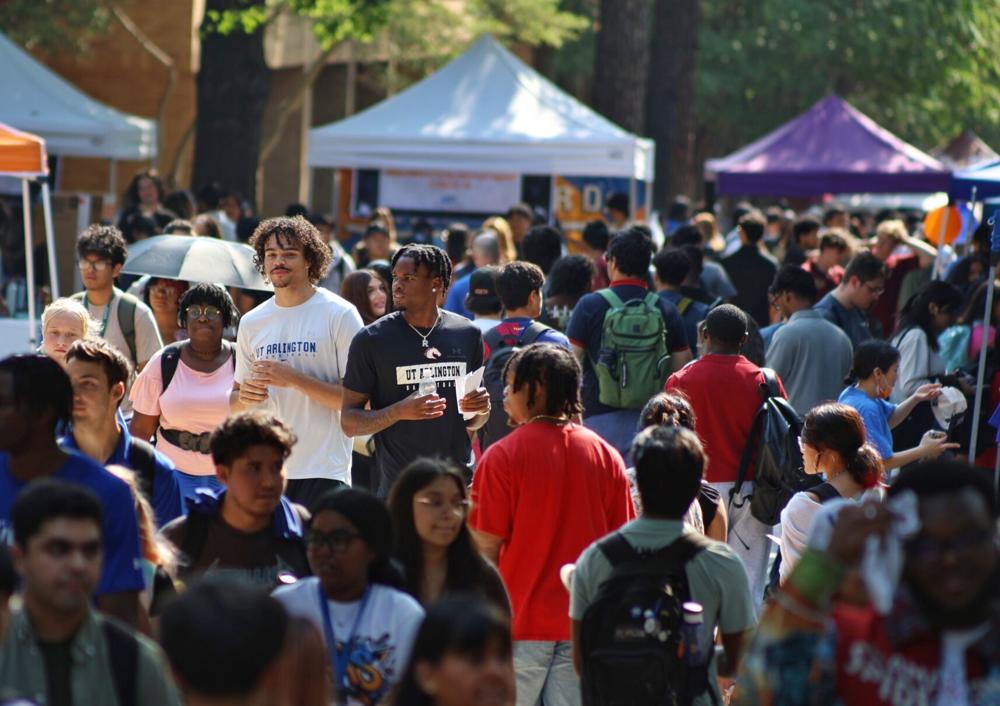 Activity Fair Day connects students and campus organizationsAs Mavericks walked through the University Center mall Wednesday, they were greeted by multiple organizations and clubs during the Activity Fair Day and Maverick Cookout. The event invited students to meet face-to-face with UTA organizations, departments and clubs, which showcased their services and involvement opportunities. This year, about 300 organizations and 10 vendors participated in the fair, said Tristian Brooks, student activities coordinator in the Office of Student Organizations. “It is proven that getting involved in a student organization helps with retention and overall satisfaction with having a good time at the university,” Brooks said. Chris Choi, president of the Korean Student Association, said the organization’s goal at the fair was to reach new Mavericks on campus and encourage students to join and enjoy themselves throughout the year. Choi said events like the activity fair are important because they give organizations a chance to introduce themselves without pulling students away from school. The event also gave the group a boost in recruitment. The UTA Wranglers are a spirit organization that supports Maverick athletic teams, said Jaysen Johnson. The Wranglers use the annual event to connect with new students and boost game attendance. Johnson said his favorite part of the fair was seeing all the different organizations and groups adding up every year and the diversity the campus offers. Ayehush Assefa said she attended the activity fair after she noticed students gathering and that she'd been wanting to learn more about UTA organizations. Assefa said she visited every table at the fair and found each group unique in its own way. “I love this so much. I think it’s very helpful, and I’m glad UTA is doing this,” she said. @samip.parajuli.54 news-editor.shorthorn@uta.edu
Activity Fair Day connects students and campus organizationsAs Mavericks walked through the University Center mall Wednesday, they were greeted by multiple organizations and clubs during the Activity Fair Day and Maverick Cookout. The event invited students to meet face-to-face with UTA organizations, departments and clubs, which showcased their services and involvement opportunities. This year, about 300 organizations and 10 vendors participated in the fair, said Tristian Brooks, student activities coordinator in the Office of Student Organizations. “It is proven that getting involved in a student organization helps with retention and overall satisfaction with having a good time at the university,” Brooks said. Chris Choi, president of the Korean Student Association, said the organization’s goal at the fair was to reach new Mavericks on campus and encourage students to join and enjoy themselves throughout the year. Choi said events like the activity fair are important because they give organizations a chance to introduce themselves without pulling students away from school. The event also gave the group a boost in recruitment. The UTA Wranglers are a spirit organization that supports Maverick athletic teams, said Jaysen Johnson. The Wranglers use the annual event to connect with new students and boost game attendance. Johnson said his favorite part of the fair was seeing all the different organizations and groups adding up every year and the diversity the campus offers. Ayehush Assefa said she attended the activity fair after she noticed students gathering and that she'd been wanting to learn more about UTA organizations. Assefa said she visited every table at the fair and found each group unique in its own way. “I love this so much. I think it’s very helpful, and I’m glad UTA is doing this,” she said. @samip.parajuli.54 news-editor.shorthorn@uta.edu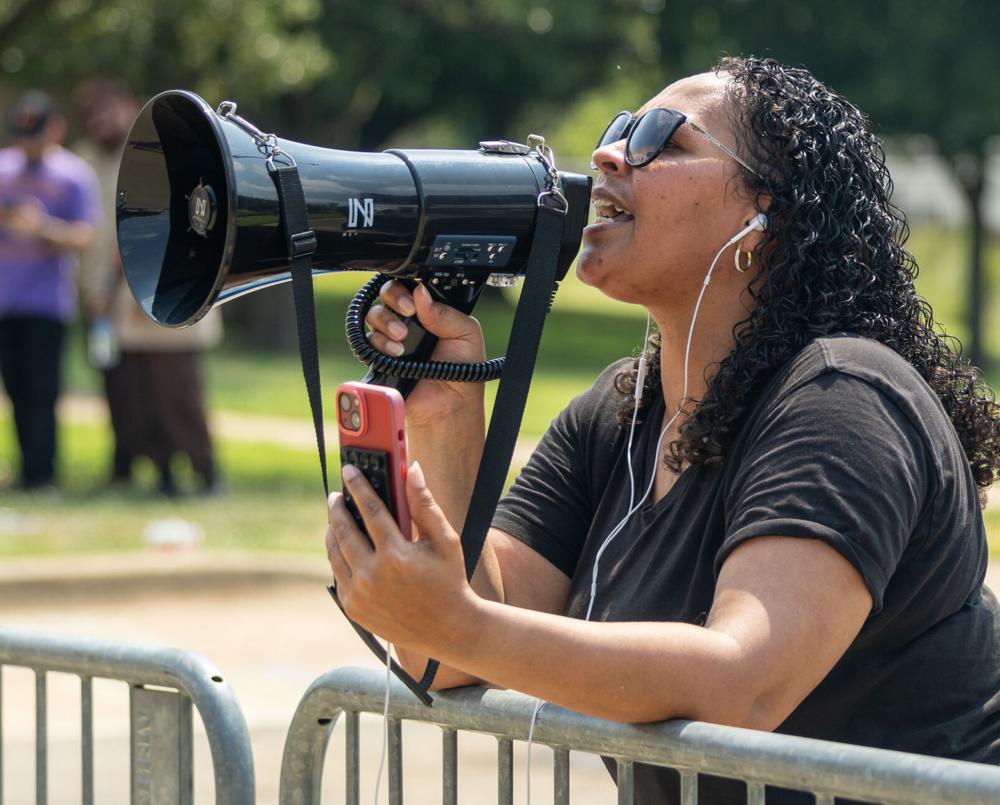 Protesters rally against Arlington ICE recruitment fairDozens of protesters gathered outside Esports Stadium Arlington throughout Tuesday and Wednesday in response to a mass U.S. Immigration and Customs Enforcement hiring fair. The hiring event comes as part of ICE’s recent expansion initiative, which has continued ramping up nationwide, bolstered by revamped hiring benefits and patriot-centered marketing. The U.S. Department of Homeland Security also recently waived the age cap for new ICE applicants. The agency’s recruitment efforts reinforce preexisting tensions caused by President Donald Trump’s increased deportation rates and strong immigration policies. In January, Trump signed an executive order tightening immigration laws to remove illegal immigrants from the U.S. The order states that unlawful immigrants pose significant threats to national security and public safety. On Wednesday, several protesters came together in a lot across from the esports stadium, where they confronted and criticized attendees entering the venue for the ICE hiring. Eddie Delgado, Fort Worth Area Indivisible member, 44, said many people in the community are beginning to take a stand against the mass deportations. “We need to protect Black and brown people. We need to protect our communities, and we can't have this anymore,” Delgado said. “For them to hold a recruiting event to try to recruit 1,000 people in the DFW area, it's obvious what's about to happen in this area.” He also criticized ICE’s hiring incentives. “They can afford $50,000 sign-on bonuses, but they can't afford to pay for school lunches for kids. They can't afford health care for people. They're taking away Medicare,” Delgado said. Arlington resident Teresa Dunham, 65, like several others, shouted criticisms from across the street at attendees walking into the hiring fair. She called it “the walk of shame.” Dunham said ICE’s goal to expand is an intimidation tactic and that the agency is not following the proper legal process before taking people into custody. Antonio Rodriguez, Brown Berets NTX member, said the protest is for people to stand up to defend themselves and defend their human rights. “The time is now,” Rodriguez said. A counterprotester was also present in support of ICE, but declined to speak with The Shorthorn. ICE’s new initiatives gained funding through the One Big Beautiful Bill Act, which was signed into law in July. The act provides $165 billion to the Department of Homeland Security for causes such as hiring additional U.S. Customs and Border Protection personnel, increasing capacity at ICE detention facilities and funding ICE’s new hiring incentives. Over 80,000 people applied to join ICE in less than a week after the new incentives were announced, according to a Department of Homeland Security press release. The agency also recently began using Uncle Sam in recruitment posters, evoking imagery of World War I U.S. Army recruitment posters. One ad calls for former Department of Homeland Security workers to “return to mission.” “The amount of interest in working for ICE is unprecedented. We’ve never seen numbers like this before,” said acting ICE director Todd Lyons in a press release. “We’re looking to hire thousands of patriotic Americans who care about justice, accountability and the rule of law, and we know Arlington is a great place to start.” @PMalkomes @wall035203 news-editor.shorthorn@uta.edu
Protesters rally against Arlington ICE recruitment fairDozens of protesters gathered outside Esports Stadium Arlington throughout Tuesday and Wednesday in response to a mass U.S. Immigration and Customs Enforcement hiring fair. The hiring event comes as part of ICE’s recent expansion initiative, which has continued ramping up nationwide, bolstered by revamped hiring benefits and patriot-centered marketing. The U.S. Department of Homeland Security also recently waived the age cap for new ICE applicants. The agency’s recruitment efforts reinforce preexisting tensions caused by President Donald Trump’s increased deportation rates and strong immigration policies. In January, Trump signed an executive order tightening immigration laws to remove illegal immigrants from the U.S. The order states that unlawful immigrants pose significant threats to national security and public safety. On Wednesday, several protesters came together in a lot across from the esports stadium, where they confronted and criticized attendees entering the venue for the ICE hiring. Eddie Delgado, Fort Worth Area Indivisible member, 44, said many people in the community are beginning to take a stand against the mass deportations. “We need to protect Black and brown people. We need to protect our communities, and we can't have this anymore,” Delgado said. “For them to hold a recruiting event to try to recruit 1,000 people in the DFW area, it's obvious what's about to happen in this area.” He also criticized ICE’s hiring incentives. “They can afford $50,000 sign-on bonuses, but they can't afford to pay for school lunches for kids. They can't afford health care for people. They're taking away Medicare,” Delgado said. Arlington resident Teresa Dunham, 65, like several others, shouted criticisms from across the street at attendees walking into the hiring fair. She called it “the walk of shame.” Dunham said ICE’s goal to expand is an intimidation tactic and that the agency is not following the proper legal process before taking people into custody. Antonio Rodriguez, Brown Berets NTX member, said the protest is for people to stand up to defend themselves and defend their human rights. “The time is now,” Rodriguez said. A counterprotester was also present in support of ICE, but declined to speak with The Shorthorn. ICE’s new initiatives gained funding through the One Big Beautiful Bill Act, which was signed into law in July. The act provides $165 billion to the Department of Homeland Security for causes such as hiring additional U.S. Customs and Border Protection personnel, increasing capacity at ICE detention facilities and funding ICE’s new hiring incentives. Over 80,000 people applied to join ICE in less than a week after the new incentives were announced, according to a Department of Homeland Security press release. The agency also recently began using Uncle Sam in recruitment posters, evoking imagery of World War I U.S. Army recruitment posters. One ad calls for former Department of Homeland Security workers to “return to mission.” “The amount of interest in working for ICE is unprecedented. We’ve never seen numbers like this before,” said acting ICE director Todd Lyons in a press release. “We’re looking to hire thousands of patriotic Americans who care about justice, accountability and the rule of law, and we know Arlington is a great place to start.” @PMalkomes @wall035203 news-editor.shorthorn@uta.edu
- Texas universities may be impacted by various laws going into effect Sept. 1Clarification: Over 1,000 bills were signed, not passed, into law by Gov. Greg Abbott. Only the legislature passes bills. Over 1,000 bills were signed into law by Gov. Greg Abbott from the 89th regular legislative session, which finished June 2. Over 800 new laws will go into effect Sept. 1. While all of the laws put into effect after this session will have an impact on society and individual lives, several of these bills will directly affect the lives of students and faculty in higher education. The Shorthorn compiled a list of several laws going into effect Sept. 1 that might impact students and universities. HB 102 This bill states that institutions of higher education that provide early registration for courses and programs to any group of students are now required to include students enrolled in a Reserve Officers’ Training Corps program, in a corps of cadets or in a maritime academy. HB 4848 This bill aims to expand flexible and affordable degree pathways to better align with workforce demands and nontraditional student needs by requiring university systems in Texas to offer competency-based baccalaureate degree programs in at least one institution. The total student cost for participating will be capped at no more than half the average cost of attendance and will be adjusted to annual inflation. SB 37 This bill provides that faculty councils or senates at public institutions of higher education be abolished unless they meet certain criteria. SB 769 This bill instructs the Texas Higher Education Coordinating Board to study and report on the state of students with disabilities in Texas colleges and universities, including barriers to admission, total enrollment levels, availability of accommodations and related school policies. SB 800 This bill will require universities to provide a video on the institution’s Title IX office contact information, location, coordinators’ names and available services. The video must also cover how to report sexual assault to the institution. Universities will also be required to print the national suicide prevention lifeline, the crisis text line and the national sexual assault hotline contact information on future IDs. SB 1273 This bill will establish the Higher Education Research Security Council with the intention of promoting secure academic research at tier one research institutions while mitigating the risk of foreign espionage and interference. The council will meet quarterly to develop state-wide research security protocols, establish accreditation for security excellence, create an annual training program for tier one universities and submit an annual report to the relevant committees and the attorney general of Texas. SB 1401 This bill will establish the Texas Mental Health Profession Pipeline Program, with the intention for institutions to develop pipeline programs to provide clear, guided pathways for students who transfer to participating institutions to pursue a baccalaureate degree, postbaccalaureate degree or certificate in various mental health professions. SB 1534 The Texas Higher Education Coordinating Board will conduct a study identifying the gaps in health physics education and training provided by higher education and assessing workforce needs in the nuclear energy and radiological safety sectors. SB 2431 This bill requires private and public universities to build on existing study abroad programs and provide an option where participating students in the program can earn the allotted foreign language credit required by the institution. SB 2615 This bill will restrict remote work for employees of public institutions of higher education, allowing faculty to work from home only under certain conditions, such as illness, disability or when their role does not require consistent in-person engagement. SB 2972 This bill, also known as the “Campus Protection Act,” addresses free speech by allowing universities to restrict protests, speeches and wearing facial coverings or masks during expressive activities. It could call for people engaging in expressive activities on campuses to present proof of identification and status at the university. SB 2995 With this bill, the Texas Higher Education Coordinating Board will develop a financial aid displacement advisory detailing common reasons for aid displacement and how students can avoid aid displacement. It aims to ensure students are prepared in the event of aid displacement. It will require universities to include information on how to apply for aid, a timeline for the process and deadlines and contact information on the admission forms stating where the student may seek advice regarding aid. SB 3039 This bill is intended to provide more transparency for transferring students by requiring institutions to identify existing barriers and emerging issues for students. It will require institutions to detail their goals to increase the number, success and persistence of transfer students, as well as the institution’s actions to serve current and prospective transfer students. Institutions will be required to include on their website the five majors with the highest number of courses for which academic credit is denied or not applied, and an analysis of the institution’s performance regarding application and admission rates, financial aid awarded, the projected time to complete an academic program and baccalaureate graduation rates. @ATClements03 news-editor.shorthorn@uta.edu
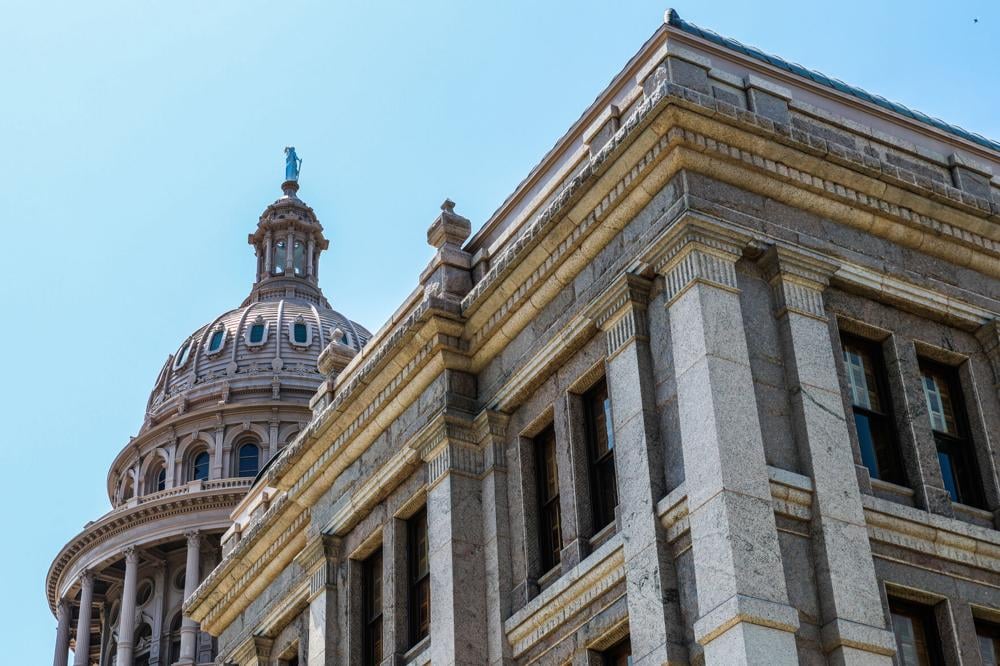
- Students connect with painting, positivity at Bob Ross painting nightA brush slowly moved across the canvas, creating a backdrop of pinks, whites and blues, crafting mountains, sunsets, grassy pastures and trees. Dressed as Bob Ross, Graham Spencer, Fellowship of Christian University Students pastor, led about 140 students during the Bob Ross painting night Monday in the Bluebonnet Ballroom. Prior to the event, Spencer watched one of Ross’ videos to prepare for the role, taking note of his mannerisms and speech patterns. “I’m not great at his accent or voice, but it feels very natural to say the things that he says,” Spencer said. He said his favorite part about playing the character is that Ross was a positive person. While canvases were provided, some painted on different materials. Automotive engineering sophomore Ahmed Alzayabi painted his landscape, titled “Monday Morning,” on a paper towel. An image of green grass, trees, a stick figure and a golden sun overtook the tiny sliver of the paper towel. Alzayabi said he based the painting on a regular Monday morning. He said he saw what everyone else was doing and wanted to paint something different. Although many did not come with a background in painting, some did have a technique. Emily Long, resource and energy engineering junior, said she wanted her piece to be more impressionistic. “I’m going to make blobs more than more detailed realism painting,” Long said. Laughter and conversation filled the air as attendees showed one another their paintings. Long said events like the painting night give individuals an activity to do together while taking the edge off. As the night went on, Spencer gave many Ross-isms, one being, “Tap, tap, tap.” Long said she loves Ross’ quote: “We don’t make mistakes; we just have happy little accidents.” “When you embrace failure with that kind of attitude, you are much more free to make mistakes, and you’re also free to be innovative,” Long said. @tay._.sansom news-editor.shorthorn@uta.edu
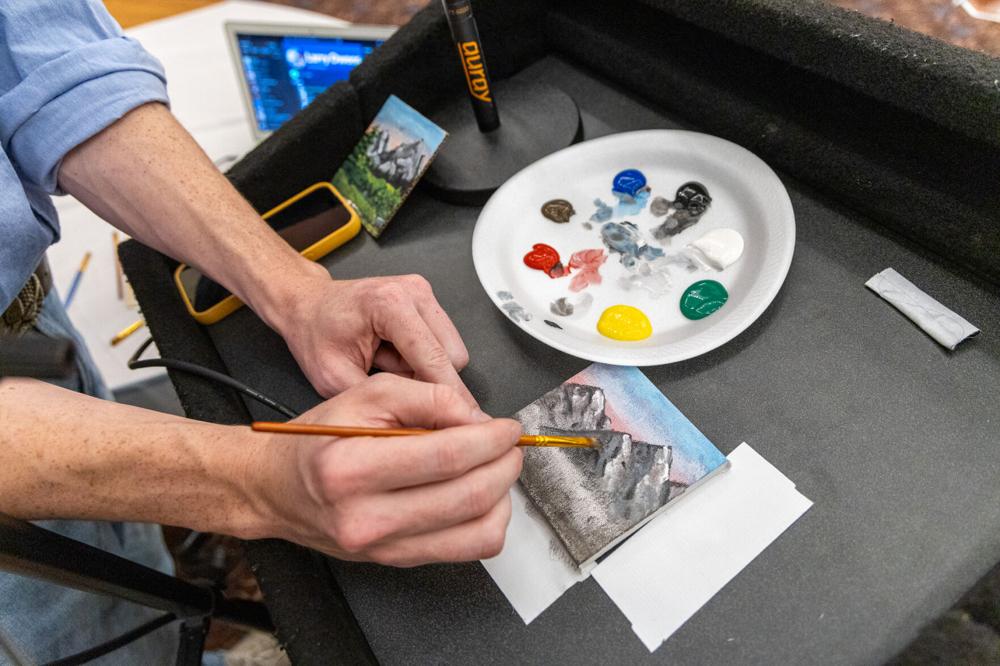
- Planetarium to host concert series featuring local artistsThe UTA Planetarium will host various local artists from September through November as part of its 2025 concert series. The series aims to blend art with science, allowing students to listen to live music under the atmosphere of space, with its 60-foot dome delivering surround sound and high-resolution visuals. Tickets are $35 for general admission, $30 for UTA faculty and staff, and $25 for children or UTA students. The tickets include appetizers, and a cash bar will also be available. All shows will start at 7 p.m., and doors open with a reception at 6 p.m. Here’s a list of the upcoming monthly lineup. Diana Rojas with Louise Fristensky Diana Rojas, an interdisciplinary artist, will perform Sept. 26 at the planetarium. Rojas approaches the role of technology in art making as a catalyst for larger conversations of existence, consciousness and metaphysics, according to her website. Isaac Sloane and The Sound Brigade Isaac Sloane and The Sound Brigade, the psychedelic jazz-infused blues and rock ’n’ roll band, will perform Oct. 3 at the planetarium. The six-piece group provides a unique blend of in-your-face rock ’n’ roll and soulful blues with elements of virtuosic jazz, according to UTA’s website. Helium Queens Helium Queens, the futuristic, sci-fi, electronica band that is part performance art will perform Nov. 20 at the planetarium. The band is the brainchild of Poppy Xander, singer, keyboardist and composer. @_.lexlie_ news-editor.shorthorn@uta.edu
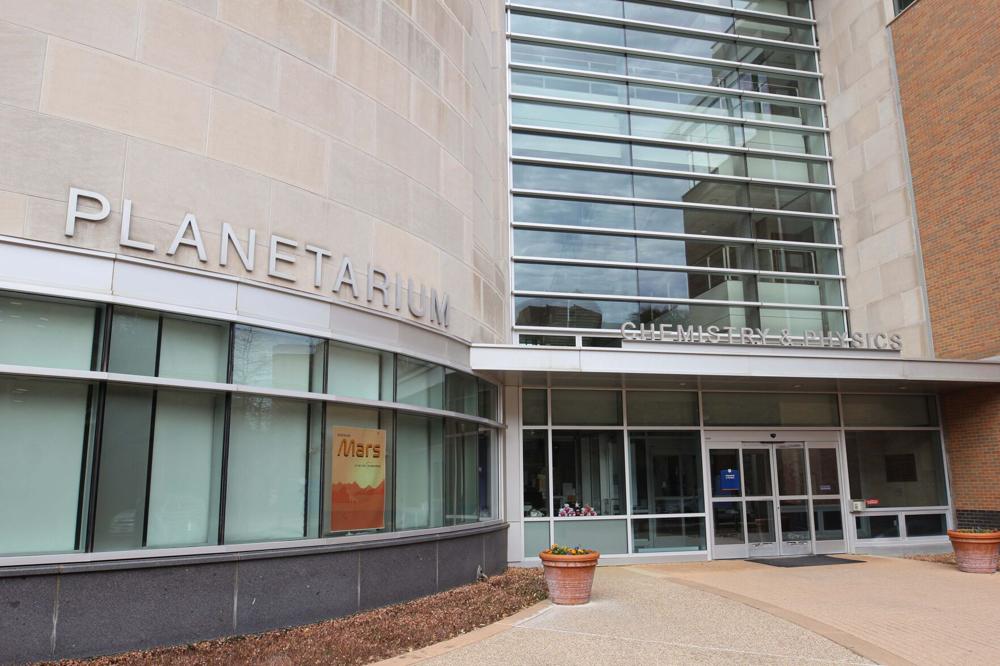
- Construction projects across campus continueWith the fall semester underway, the university is working on construction projects to update classrooms, labs and other campus spaces. Don Lange, facilities and campus operations assistant vice president, said the university’s goal is to ensure its buildings are designed to support research, student success and academic needs. “Just staying stagnant doesn’t grow our ability to do better and make better,” Lange said. UTA has several construction projects underway. Life Science Building Construction on the Life Science Building began in 2023 with the intent to expand and renovate the existing facility. Lange said the building is scheduled to open in December 2027 for classes to begin in 2028. According to The UT System’s fiscal year 2025-2030 Capital Improvement Program budget, the cost of the project is about $182.87 million. Lange said the renovation includes two new classroom types. One will feature a round setup with only six to eight rows, with space for the instructor in the center for more personal interaction with students. The other is a multifunction room that is elevated with fixed seating and tables. The project will also include several research and teaching labs, mechanical and electrical upgrades, plumbing improvements and several code-compliance updates. One of the unique additions is a fermentation lab in the north section of the building where students will be able to brew beer, Lange said. UTA West The new building will be a new 51.1-acre campus in western Fort Worth, according to previous Shorthorn reporting, and is still in the design stage. Lange said infrastructure work will start in December, while construction on the first building is expected to start in February 2026. The project is expected to finish by spring 2028, in time for fall classes. University Center The University Center is also in the design stage for major construction and renovation. Lange said the building has undergone several renovations in the past and has multiple inefficient spaces. The UT System’s fiscal year 2025–2030 Capital Improvement Program budget lists the project cost at $175 million. The project aims to create a more efficient building with more usable square footage, updated equipment and energy-saving systems. Construction timelines are not yet finalized, but the project was approved in 2024 and is expected to finish by mid-2028, according to previous Shorthorn reporting. Maverick drone facility The Maverick Autonomous Vehicle Research Center at the University of Texas at Arlington Research Institute in Fort Worth, a $2.3 million project, according to previous Shorthorn reporting, is set to open during the fall semester. Construction began in spring 2025 and is now complete, with a grand opening set for Sept. 16. Because the 120-by-150-foot structure is fully enclosed with nets, it counts as “indoors” under Federal Aviation Administration rules, so large-scale autonomous flights can be done without a certified pilot for each drone. Principal research scientist Nicholas Gans said the motivation behind the project was to give students and faculty a safe environment for researching the use of drones. The facility has a motion capture camera system that can track drones, vehicles or people with high accuracy. Gans said the project strengthens UTA’s ability to win major research grants from agencies such as NASA and the Department of Defense. It will also allow collaboration with local businesses. “There’s no other university that has a facility like this,” he said. @samip.parajuli.54 news-editor.shorthorn@uta.edu
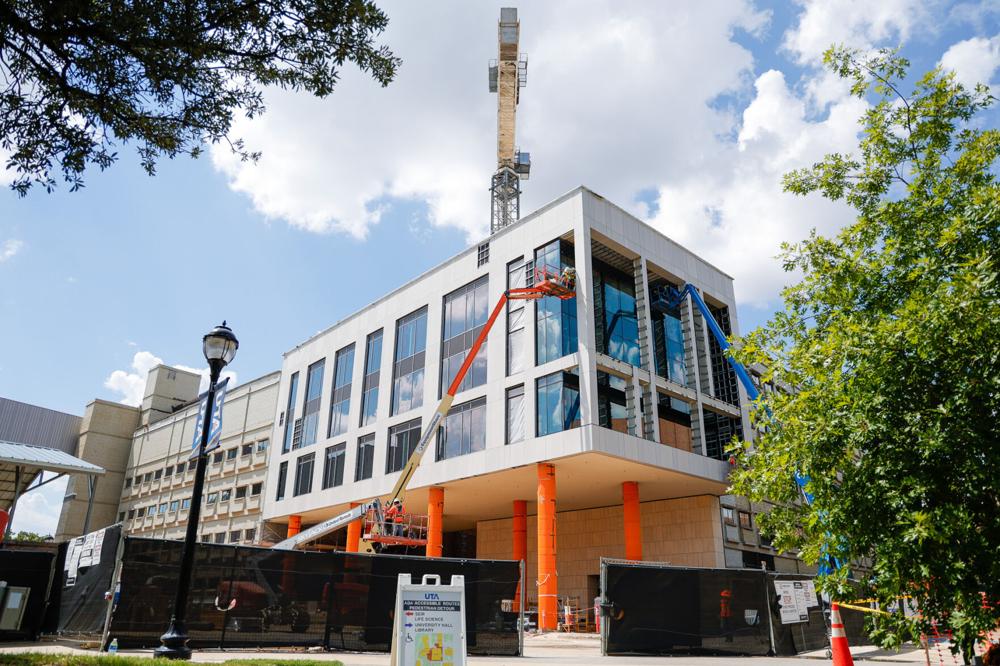
- Campus ministry to host Bob Ross painting nightFocus, a campus ministry at UTA, is hosting a Bob Ross painting night from 7 to 9 p.m. Monday in the Bluebonnet Ballroom at the University Center. Focus pastor Graham Spencer will be leading the event, donned in a Bob Ross costume. Eventgoers are also encouraged to dress as Ross, Spencer said. “I would love if other people showed up as Bob Ross,” he said. Focus will provide all the supplies, including 4-by-4-inch square canvases. Spencer will lead through one of Ross’ classic videos. After the video, there will be a break followed by free painting time. “People don’t have to have any skills; they don’t need to have any supplies. We bring that all and then it’s just about having fun and connecting,” Spencer said. Focus became a registered campus organization in 2015. It is part of a wider network of churches and ministries in the Dallas-Fort Worth and Denton areas. Participants gather weekly in student-led small groups called “Cores” where they share life, pray and read the Bible. “Just want people to know that they have a place on campus to be seen,” Spencer said. “And if it’s something as silly as a Bob Ross painting, I hope they can connect with people.” @ATClements03 news-editor.shorthorn@uta.edu

- UTA's largest new residence hall provides housing, community for studentsAfter more than a year of construction, Maverick Hall is now open for students. The $116 million hall is the newest and largest addition to the university’s on-campus housing, with five stories and 205,638 square feet. Maverick Hall will house 654 students across four wings and contains three room types: double, private and single. The double suite is the same price as Vandergriff Hall and West Hall at $6,745, while a private suite is $8,129 and a single suite costs $9,300 per academic year, said Michael Eldridge, housing operations assistant director. Landscaping is the last of the construction to be completed, and should be finished in the coming weeks, said Mari Duncan, director of apartment and residence life. Currently, workers are finishing the quiet courtyard where a hammock garden will be. The other courtyard will have picnic tables and a grill. It will serve as a space where students can play concrete ping pong, cornhole and chess, Duncan said. Weather was one of the biggest issues during construction, project manager David Pinto said. Construction was originally planned to start with the basement in section D, but weather caused delays, and it started in section A instead. The plans had to be restructured, resulting in the construction going backward, Pinto said. Located on the west side of campus near the Maverick Activities Center and The Commons, the residential hall has several amenities for students, including eight study spaces, laundry rooms and kitchens on every floor. Students also have access to a relaxation room where massage chairs will be available for use. Musical theater freshman Emmerson Pullen said the hall offers tons of space for comfort and studying. Around 2,700 students live on campus, and the residence halls are at 100% capacity, Eldridge said. “We essentially saw that there was a huge need, based on our waitlist, to be able to accommodate as many students that wanted to live on campus,” Eldridge said. Multiple factors were taken into consideration, including parking, as the residential parking lot on West Campus was converted into Maverick Hall when construction began in 2024. Working closely with the parking office, Housing researched what spaces were being occupied and made sure that enough parking spaces would be available for the upcoming year, Eldridge said. Residents can park in the Resident West parking lots, located by Meadow Run and Timber Brook, and the West Campus Parking Garage if they have a dual permit. The design process of the building was intentional, from matching the outside with West Hall to the conference-style study rooms, Duncan said. “It was before the project was proposed that we knew that we wouldn’t just do a cookie-cutter repeat of what we were doing and that we would be designing something that complemented West but had its own identity,” she said. As the final steps drew near and the hall was closer to opening, the excitement surrounding the project grew. Duncan said observing the excitement from other people, such as the residential assistants, made the project even more rewarding. “As soon as we walked from West Hall to Maverick Hall, we were just like, ‘Wow, this cannot be happening,’” said Javier Gallegos, nursing sophomore and residential assistant. “We finished this building in one year.” @ATClements03 news-editor.shorthorn@uta.edu
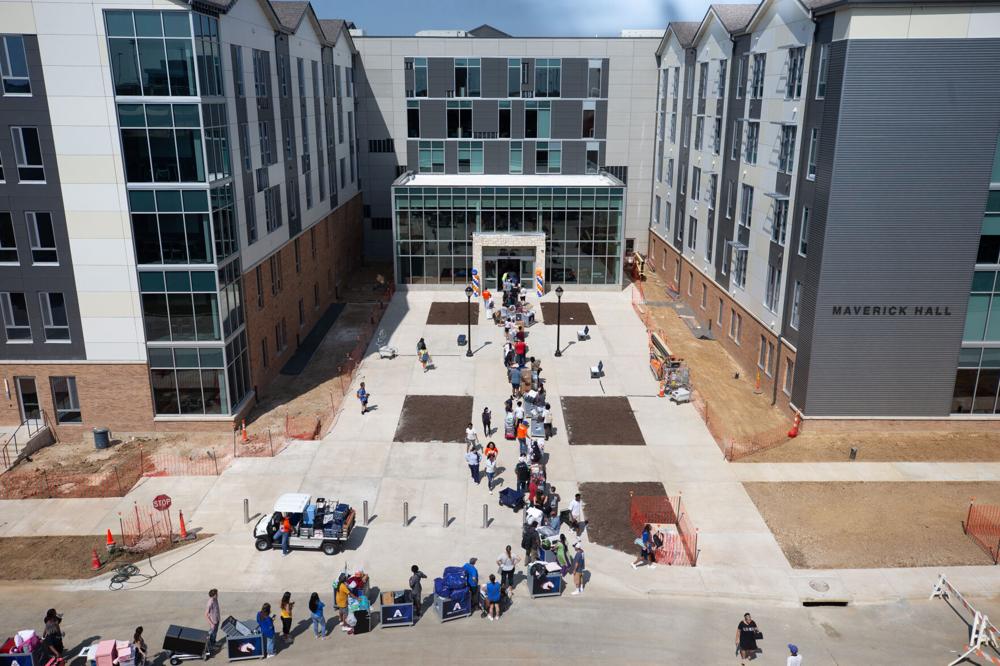
- Activity Fair Day to showcase student organizations, promote communityThe fall 2025 Activity Fair will be from 10 a.m. to 1:30 p.m. Wednesday on the University Center mall, giving students an opportunity to explore campus life and resources beyond the classroom. Michael Onuchovsky, assistant director for the Office of Student Organizations, said nearly 200 groups have signed up so far for tabling, and he anticipates having more than 300 booths by the event. About 50 departments, community sponsors and vendors from the Arlington and Dallas-Fort Worth area will be participating, alongside Campus Recreation and Maverick Dining, which are helping with the Maverick Cookout and recess. Onuchovsky said the fair will feature some novelty items such as bounce houses, slides and character artists for the first time on campus. Onuchovsky said the fair is exciting for freshmen looking for a place of belonging at UTA. “No matter what passion you have, there's something there for you, right? And no matter your interest,” he said. To help students overwhelmed by the number of participants, Student Organizations offers a 15-minute involvement consultation where students can share their interests and be directed toward the groups they share their passion with. Onuchovsky said students are encouraged to download the MavEngage Mobile app, where they can preview the participating organizations, join their group chats and view upcoming events throughout the year. “It's really, really important for us that our students are able to find somewhere to get involved and get connected with the institution,” Onuchovsky said. @samip.parajuli.54 news-editor.shorthorn@uta.edu

- Hot and cool weather with chances of rain expected in Dallas-Fort Worth this weekDallas-Fort Worth residents can expect a hot and dry start to the week with cooler temperatures and chances of rain and thunderstorms starting Tuesday. Sarah Barnes, National Weather Service meteorologist, said the area will stay hot and rain free Monday, with highs in the mid to upper 90s. Thunderstorm chances will begin Tuesday and continue through the weekend, bringing slightly cooler temperatures in the mid to upper 80s. Temperatures may rise slightly on Thursday and Friday before a cold front brings things back down Saturday. “Just keep an eye on the weather and bring your umbrella this week,” Barnes said. @samip.parajuli.54 news-editor.shorthorn@uta.edu

- UT System ends faculty senates across 14 institutions to comply with Senate Bill 37The UT System Board of Regents authorized university presidents Thursday to replace faculty senates with less independent groups monitored by regents. Limiting faculty's administrative control is part of a new law going into effect Sept. 1. The decision affects all 14 institutions within the UT System, although it’s unclear for now how it will directly impact UTA. Under Senate Bill 37, faculty senates are only permitted to function as advisory groups, and any proposed changes must be approved through an institution's governing body, such as the UT System. Faculty senates typically act as a representative body to an institution and or larger school system and work with university administration on varying issues. The groups can now only be formed with the permission of a governing body. Some Texas schools have opted to reform existing bodies, such as the University of North Texas System and the University of Houston. Others abolished them. Before Thursday’s vote, Kevin Eltife, UT System board chairman, said that the board will thoughtfully consider how to proceed. “We are going to take our time, we’re going to go slow, we’re going to figure out the best approach if we’re going to have these faculty senates on every campus or not,” Eltife said. “Some may not have them; we don’t know yet.” SB 37 was authored by Texas Sen. Brandon Creighton, R-Conroe, who also authored a ban on diversity, equity and inclusion initiatives in universities during the last legislative session. The law allows the governor-appointed regents more control over day-to-day decisions at universities. A committee will be created to monitor university curricula, and minors with low student enrollment may be canceled. Creighton said in an April press release that authority must belong to the Board of Regents and not faculty. "For too long, unelected faculty senates have operated behind closed doors, steering curriculum decisions, influencing institutional policy, issuing political statements to divest from Israel, and even organizing votes of 'no confidence’ that undermine public trust," Creighton said in the press release. In an email statement, the UT System said the Board of Regents will consider policy recommendations that may bring back faculty senates in the upcoming months. “The advisory groups will enable UT faculty to continue to provide counsel and perform important and valued functions delegated to them by Regents' Rules and Regulations and institutional policies,” the statement reads. @PMalkomes news-editor.shorthorn@uta.edu
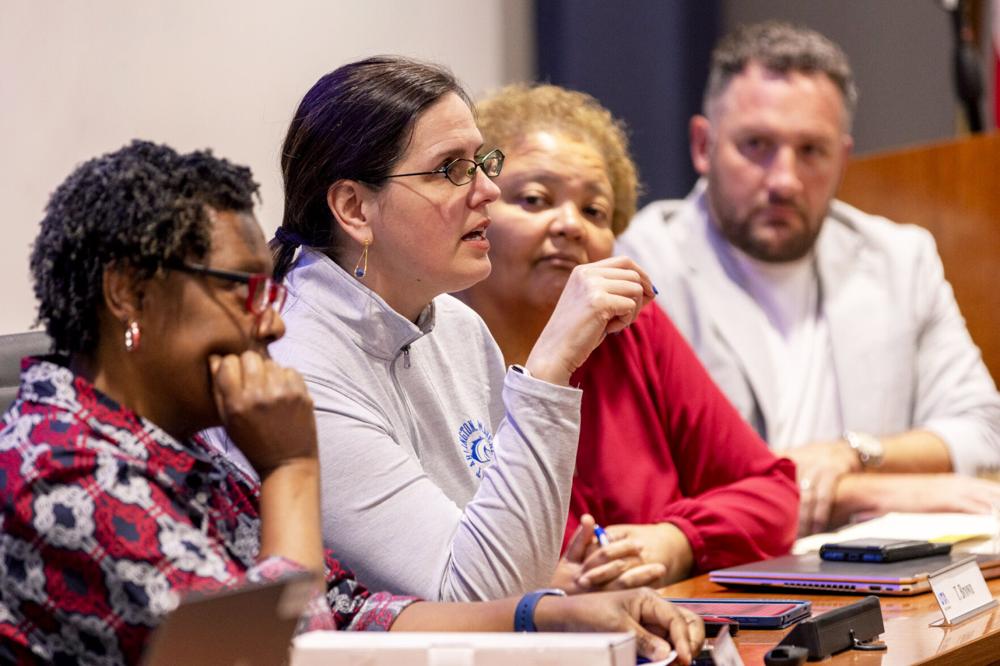
- Meet the new Student Government leadership teamWith new leaders, fresh goals and a drive to amplify student voices, the 2025-26 Student Government leadership team is gearing up for a new semester. Student Government was founded to bridge the gap between UTA students and administration, Student Government President Effua Jordan said. The organization aims to increase civic engagement for all students, including participation in local, state and national government, and is responsible for handling all campus resolutions. “No voice is too small for us to hear, no problem is too small for us to solve,” said Andres Morales, Student Government vice president. The organization is comprised of three branches: executive, legislative and judicial. The executive branch oversees two committees: the External Relations Committee, responsible for hosting events such as Cookies with Cowley and Meet Your Government, and the Legislative Relations Committee, which is more engaged with the Arlington Town Hall and state and federal government to increase student voter turnout. The legislative branch serves as the representative body of Student Government, and is comprised of senators from each academic college and school on campus. The senators act as the voice of their peers, working to write, research and vote on resolutions. The judicial branch consists of the Supreme Court, which is comprised of seven justices, and serves as the primary body for hearing constitutional disputes between the three branches. The court also oversees the Registered Student Organization Allocation fund. Leading the charge of Student Government is Student Body President Effua Jordan, Vice President Andres Morales, Chief Justice Issac Kim, Chief of Staff Lya Lang and Speaker of the Senate Austin Palacios. As president, Jordan is the point of contact between the administration, Student Body and government, she said. She also ensures the workings of the Student Senate, executive and judicial branches. To prepare for her role, Jordan has introduced herself to the new administration and has begun working on events for the upcoming semester. Her journey to presidency began long before this semester. As a senator, she voted on the University Center referendum and said the experience was the first time she felt accomplished in her role, which prompted her to run for chief of staff. Now she is the face of the team as president. “I felt like my time here in Student Government wasn’t done, and I had a lot of good ideas, so I decided to run for president,” she said. As vice president, Morales said he is responsible for membership, training and recruitment. He also oversees the Maverick Discount Program and assists Jordan when necessary. Morales said he is focusing on student involvement within the university and in Arlington during his term. He is also communicating with different grocers to bring more donations to the Maverick Pantry. Similar to Jordan, Morales said he also started as a senator and introduced eight resolutions during his tenure, with seven passing. He wasn’t seeking a higher position, but Deon Rodrigues, the previous Student Body president, influenced him to run. “It was more like a calling, and I just answered the calling,” he said. Kim serves as the chief justice and is responsible for managing the Registered Student Organization Allocation fund and the election supervisory board. During his term, he said he wants there to be more participation and attendance within the judicial branch since they are more closed off, and to increase the budget for the allocation fund. After Kim enlisted in the army, he said he was sought out by Rodrigues. He then went through the process of becoming a justice and fulfilled his duties. Later he decided to run for chief justice. “Since my time is limited, after college I may or may not return to school for a graduate program,” he said. “So I sought this opportunity to leave UTA better than I found it.” As chief of staff, Lang oversees the External and Legislative Relations committees. Lang said she wants to increase student engagement in Student Government and other clubs. By increasing involvement, she said, more individuals will stay on campus, and it will benefit the community. She started in the Executive Relations Committee, and through her time, she got an inside look at the chief of staff position and its impact. “I really just want to get out there more, meet new people, get involved more and just explain the mission of Student Government and encourage more students to get involved on campus,” she said. As speaker of the senate, Palacios is the head chair of the Student Senate. He said he leads the general meetings, oversees the resolution process and the four committees. During his term, he said he wants to work on diversity within resolution ideas. Starting out as a senator, he said, knowing that people saw him as a person to speak and realizing the impact of the Senate made him want to fight for more. He saw the opportunity and decided to run for speaker. “It was that moment of realization, even if it was a small amount of people that voted me in, there was people who saw me as a potential person to speak for them,” he said. @tay._.sansom news-editor.shorthorn@uta.edu
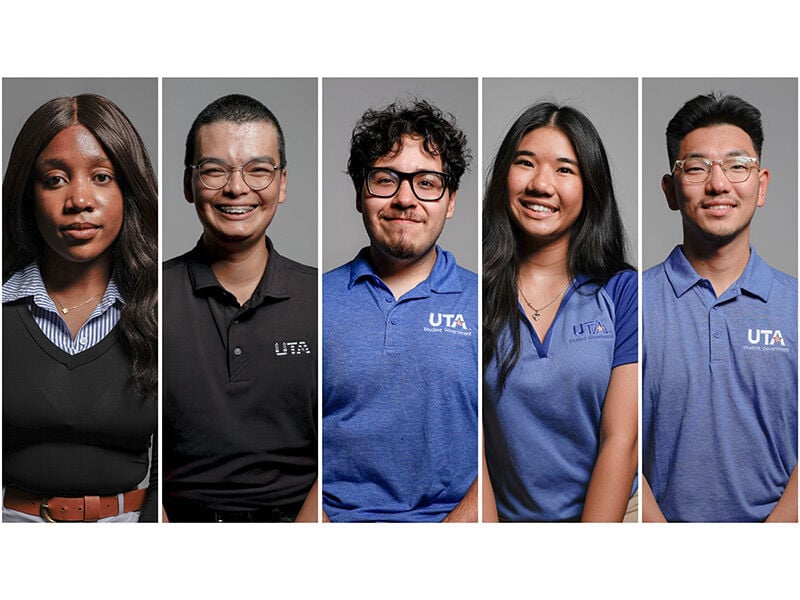
- DWI, burglary of building and disorderly conduct present in this week’s crime logThis is a crime wrap-up from Aug. 14-17 Driving while intoxicated - 2nd offense On Aug. 14, an officer observed a vehicle stopped in the middle of the street, UTA Police Capt. Mike McCord said in an email. The driver, an unaffiliated male, was stopped and arrested for DWI. He was transported to the Arlington Police Department jail. DWI is a class B misdemeanor punishable by a fine not to exceed $2,000, confinement in jail for up to 180 days, or both, with a minimum term of confinement of 72 hours. A second offense is a class A misdemeanor punishable by a fine not to exceed $4,000, up to one year in jail or both, with a minimum term of confinement of 30 days. Burglary of building, criminal trespass, evading arrest detention, resist arrest search or transport On Aug. 15, officers responded to a burglary in progress, McCord said. The unaffiliated male suspect fled from officers. He was apprehended and arrested for burglary, evading arrest or detention and resisting arrest. He was transported to the Arlington Police Department jail. Burglary of a building is a state jail felony punishable by a fine not to exceed $10,000, a jail term between 180 days and two years or both. Resisting arrest, search or transport is a class A misdemeanor punishable by a fine not to exceed $4,000, up to one year in jail or both. Evading arrest or detention is a class A misdemeanor punishable by a fine not to exceed $4,000, up to one year in jail or both. This case is still active. Disorderly conduct - fighting in public and theft of property from a person On Aug. 16, officers responded to a fight in progress, McCord said. An unaffiliated male reported that an unaffiliated female took his wallet. The female was arrested for multiple warrants and theft. She was transported to the Arlington Police Department jail. Disorderly conduct is a class C misdemeanor punishable by a fine not to exceed $500. Theft of property from a person is a state jail felony punishable by a fine not to exceed $10,000, a jail term between 180 days and two years or both. Criminal trespass On Aug. 16, a female student reported three unidentified males entered her apartment without her permission, McCord said. If the offender has not been previously convicted of trespassing on higher education property, the offense is a class B misdemeanor punishable by a fine not to exceed $2,000, confinement of up to 180 days in jail or both. If the offender has been previously convicted, the offense is a class A misdemeanor punishable by a fine not to exceed $4,000, up to one year in jail or both. This case is still active. Theft of property On Aug. 17, a male student reported the theft of his bicycle, McCord said. Theft of property valued between $100 and $750 is a class B misdemeanor punishable by a fine not to exceed $2,000, confinement in jail for up to 180 days or both. This case is still active. @wall035203 news-editor.shorthorn@uta.edu
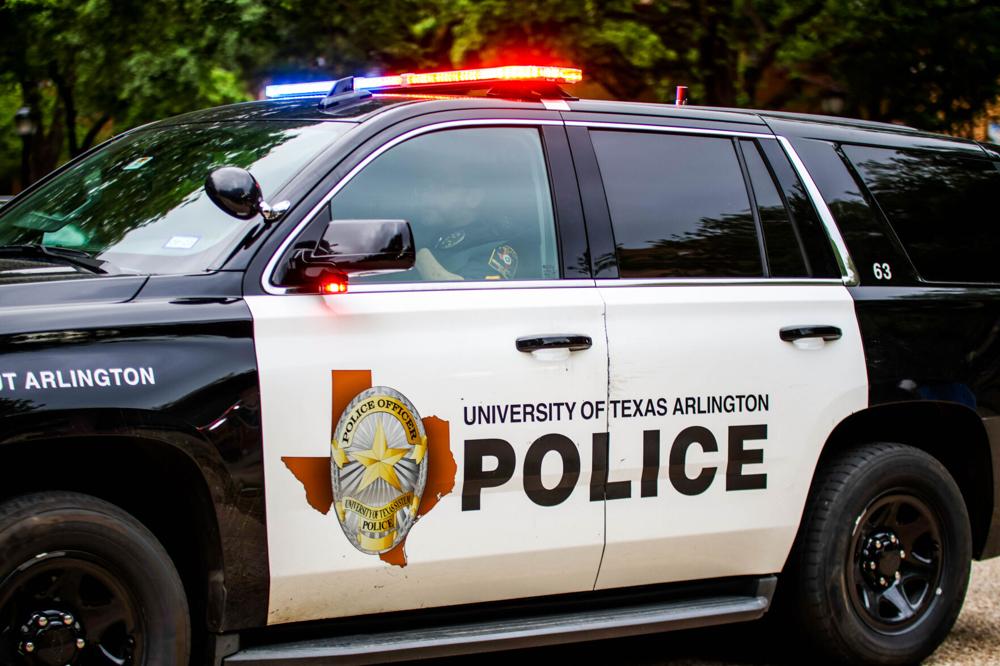
- First-generation brunch and mixer to bring UTA students and alumni togetherThe Department of Transition Programs is hosting its annual First-Gen Brunch and Alumni Mixer at 10 a.m. Saturday at the Bluebonnet Ballroom. The fifth iteration of the event will offer first-generation college students an opportunity to connect with their peers and first-generation graduates from the university. Tasha Talton, transition programs and orientation director, said the intent was to create a first-generation student success environment and to have unique, innovative and fresh events that focused on that population. “My way of connecting first-generation students to this specific event was to show them success in real time, and the best way to do that is to introduce them to first-generation graduates who are thriving in their fields, who are doing well, who have sat where they have sat before, who have experienced a similar journey that they had,” Talton said. The event will consist of a speech from President Jennifer Cowley, remarks from keynote speaker Nancy Galvan, a UTA alumna and entrepreneur, and table discussions, along with food, drinks and music. It is recommended that students preregister for the event. “I’m a first-generation graduate myself, and many of my colleagues within the department are first generation as well,” she said. “This is heart work for me, this is passion work, working with the first-generation population.” @wall035203 news-editor.shorthorn@uta.edu
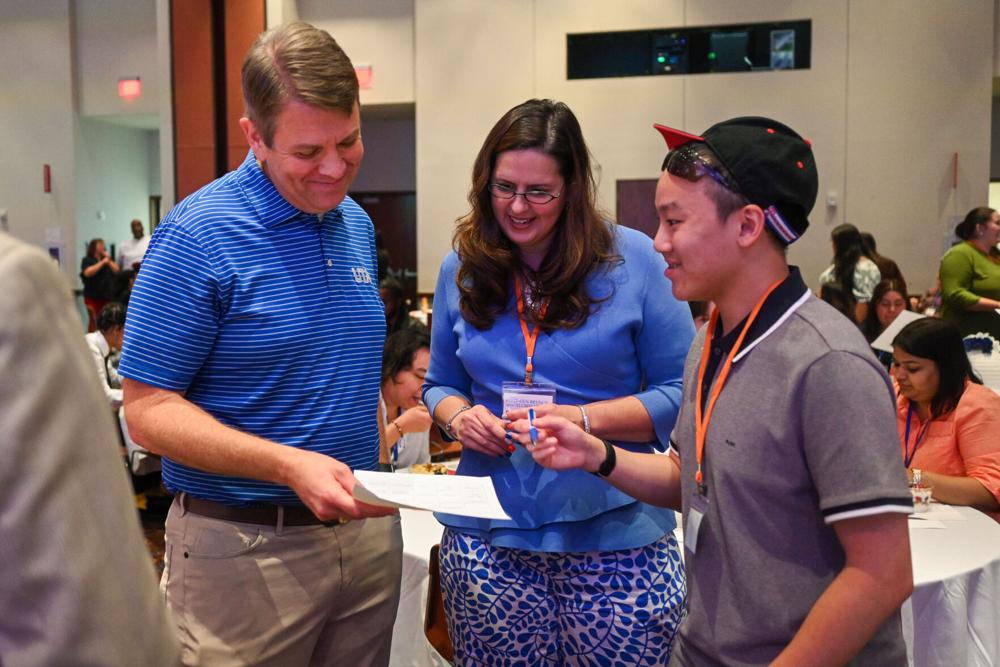
- Waffleopolis serves up sweet, fun start to the semesterAs the sun began to set, the sugary and sweet smell of maple syrup and waffles engulfed Brazos Park at the annual Waffleopolis event Wednesday. Students with waffles walked to tables, sat in groups along the astro turf and mingled while eating their sugary snack. Waffleopolis is part of Maverick Stampede, a series of events hosted in the beginning of school to welcome new and returning Mavericks. Four resident assistants, at what was once Brazos House, started the tradition 28 years ago by making waffles for students, according to previous Shorthorn reporting. The event served over 4,000 students, said James Chew, Chartwells Higher Education Dining Services resident district manager. Chew said the lines for the waffles began forming around 45 minutes before the event even began. “It’s so exciting to see the excitement on the students' faces waiting for this really cool event,” he said. Among the early arrivers was mechanical engineering freshman Evey Hoss. Hoss had been waiting in line for around 30 minutes and said she was most excited to try the sprinkles and cherry toppings. Some students had plates overflowing with ice cream, chocolate syrup, sprinkles, whipped cream and strawberries, while others kept it a little more simple. Psychology senior Zarin Sasa topped her waffle with ice cream, chocolate, whipped cream and butter. “I just want a little sundae with a side of waffle,” she said. On the other end was Andres Morales, management and operational management sophomore, who topped his waffle with butter, syrup, whipped cream, chocolate syrup, strawberries and sprinkles – with ice cream on the side. Morales, who had not previously attended the event, said he wanted to go all out and celebrate a UTA tradition that has expanded for years. “It’s exciting to see all these different Mavericks here and everybody here enjoying a fun time,” he said. @tay._.sansom news-editor.shorthorn@uta.edu

- Texas redistricting: Comparing the state and county issuesTwo months ago, a move by the Tarrant County Commissioners Court set the stage for a state and national debate over voting districts that remains ongoing this fall. County commissioners boosted Republican representation by approving redistricting maps in June. Now, the Texas legislature is undergoing the same process to gain five seats in the U.S. House of Representatives. “This is ground zero, Texas, and if it happens in Texas, it can happen anywhere in this country,” said Texas Sen. Royce West, D-Dallas, during a protest before a Texas redistricting hearing in July. Redistricting: What is it? Redistricting is the effort to redraw political maps, said Matthew Wilson, associate professor of political science at Southern Methodist University. The process every decade following the U.S. census, Wilson said. Nothing prevents lawmakers from doing so more than once between census dates. “The only thing is that constitutionally, they cannot draw lines with the purpose of decreasing minority representation,” Wilson said. Gerrymandering, which opposing parties often accuse each other of doing while drawing maps, is the drawing of districts to achieve a specific political result. “Generally speaking, when a political party, either Democrats or Republicans, have an opportunity to gerrymander, they do it,” Wilson said. The county issue In June, the Tarrant County Commissioners Court approved a new map in an unusual mid-decade redistricting. That move shifted Precinct 2, which mostly contained Arlington, from a Democratic to a Republican majority. The new map splits Arlington into multiple precincts and pushes Precinct 2, which formerly contained most of Arlington, into an expected Republican majority. The commissioners court currently favors Republicans 3-2, and Precinct 2 is up for election in 2026. Following the redistricting, Precinct 2 went from a 45.8% Republican split to a 52.4% majority, according to county data from the 2024 presidential election. Precinct 1, which was already blue, saw an increase from a 57.4% to a 66.6% Democratic majority. Precinct 3 had a minor increase in Democratic voters, and Precinct 4 saw a minor increase in Republican ones. The maps were drawn by the Public Interest Legal Foundation, a Virginia-based legal group whose authenticity was questioned by Precinct 2 Commissioner Alisa Simmons and other Democrats. The additional seat would serve as a “buffer” for Republicans, Wilson said. The wiggle room helps ensure a party can withstand bad election years and maintain its majority across multiple electoral cycles. Simmons said in an interview with The Shorthorn that redistricting is unnecessary since the county underwent the process in 2020 using the same data they have now, and determined that the population deviations for each precinct were under 2%. “We never got an explanation. The taxpayers never got an explanation as to the logic of undertaking a second redistricting effort,” she said. Tarrant County Judge Tim O’Hare and Republican commissioners Manny Ramirez and Matt Krause called the process necessary and said Democrats redistrict similarly when given the opportunity. On Aug. 14, the League of Women Voters of Tarrant County and the League of United Latin American Citizens filed a lawsuit against Tarrant County, the commissioners court and O’Hare, after what it saw as gerrymandering. Race and partisanship are highly correlated in the U.S., Wilson said. The overlap makes it difficult to tell if Republican efforts aim to diminish Democratic voters or a specific demographic. “As a practical matter, sometimes they're one in the same,” Wilson said. Republican commissioners Matt Krause and Manny Ramirez did not respond to The Shorthorn’s request for comment. State conflict On Aug. 12, the Texas Senate approved a mid-decade redistricting map as part of President Donald Trump’s effort to flip five additional U.S. House of Representatives seats. The new map now awaits approval from the Texas House, where Democrats delayed the process by fleeing the state to avoid meeting quorum. On Aug. 15, Abbott called a second special session to begin a few hours after the first ended. The midterm elections typically favor the party opposing the president, and Trump needs to maintain a U.S. House majority to push his policies through. Currently, Republicans have a 219-212 advantage in the U.S. House, with four seats vacant. Cary Cheshire, Tarrant County GOP vice chairman, said in an email to The Shorthorn that Texas’ proposed map is a response to nationwide gerrymandering from Democratic-led states. The open acknowledgment of Trump’s motivation behind the redistricting and the coordination between him and the state is unusual, Wilson said. “He really made no pretense of this being about anything other than a desire to increase Republican representation,” he said. Several states have begun preparations to redistrict following the events in Texas, most notably California, which introduced a new congressional map designed to offset the potential gains from Texas’ redistricting map. California Gov. Gavin Newsom announced that the state will hold a special election Nov. 4 to let citizens vote on a new congressional map. “We can’t stand back and watch this democracy disappear district by district all across this country,” Newsom said in a rally to announce the special election. Simmons said Texas is following the same path Tarrant County did, and its process is just as rushed. “I do believe they witnessed the success of the redistricting effort here in Tarrant County and decided to give it a try,” Simmons said. Despite similarities, Wilson said he doesn’t believe Tarrant County heavily influenced what is happening in Texas. “It may have put the idea in some people's heads, but the real impetus for the redistricting going on in Austin is not coming from Fort Worth, it's coming from Washington,” Wilson said. @PMalkomes news-editor.shorthorn@uta.edu

- Student Senate swears in new members, introduces six resolutionsThe Student Senate held its first fall semester meeting Tuesday, swearing in new senators and introducing six resolutions. Several senators from each college were sworn in to start the meeting before Student Body President Effua Jordan and Andres Morales, Student Body vice president gave welcome addresses to usher in the new year. Multiple resolutions were discussed during the meeting, two notable ones being Resolution 25-12, “No Substitute for Skill,” and Resolution 25-15, “Minimum Wage, Maximum Impact.” Resolution 25-12, “No Substitute for Skill,” seeks to have UTA require all promotional material to be labeled as created by a student, faculty member or artificial intelligence. Finance freshman Biraj Paudel said the resolution was a memorable one from the meeting and that it was good that the student senators want to hold the university accountable. “The university restricts the use of AI for the students [and] should not be able to use it for the designing purposes and other things, because laws should be good for all,” Paudel said. Resolution 25-15, “Minimum Wage, Maximum Impact,” calls for the university to establish a new minimum wage for student workers. According to the resolution, new minimum wages would provide students with more equitable compensation for their labor and contributions to the university. Resolution sponsor senator Adib Kadir said the current wages offered to students don’t account for inflation and are insufficient for students to support themselves. Since the resolution’s issue, the university has raised the minimum wage, which Kadir said changes the feasibility of the bill. “Let’s be honest, they’re probably not going to give this just right after they increased it again,” he said. Other resolutions introduced included Resolution 25-13, “Move Out of the Way,” which asks for designated parking spots for delivery and supply trucks on campus; Resolution 25-14, “Shh-tudy Rooms,” which aims to renovate study rooms in the Central Library to make them soundproof; Resolution 25-16, “Condom Convenience," which looks to expand access to condoms on campus; and Resolution 25-17, “Gimmie My Greens,” a repurposing of The Market in the University Center so that it stocks healthier foods. The Student Senate will meet at 6 p.m. Sept. 2 in the Student Government Chamber in the University Center for its second meeting. @wall035203 news-editor.shorthorn@uta.edu
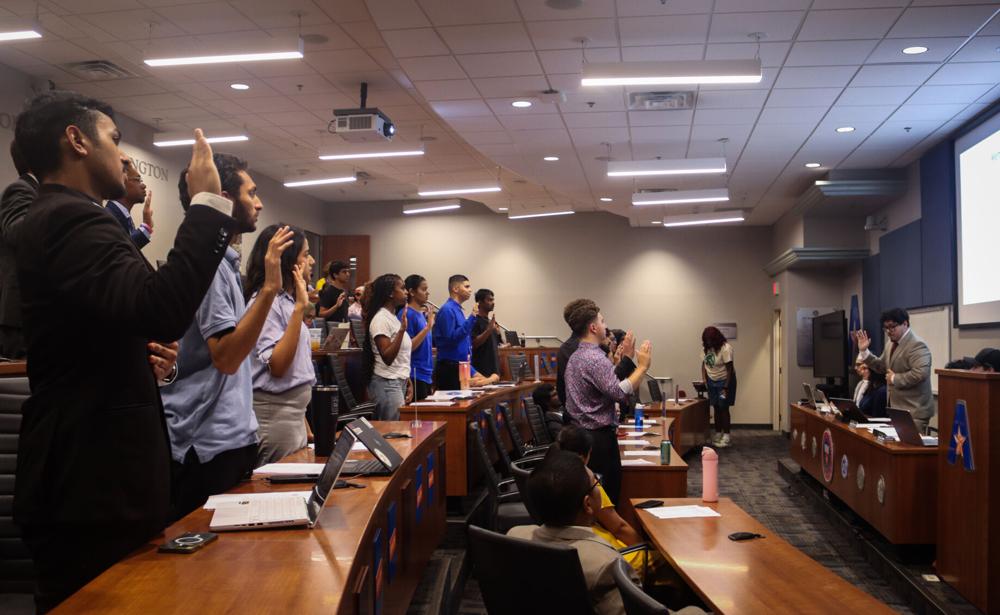
- Annual Rec Fest brings activities, communityCampus Recreation kicked off the fall semester with its annual Rec Fest Tuesday at the Maverick Activities Center, bringing students and staff several activities, prizes and opportunities to get to know different organizations. The event had tables set around the gym where students could learn about the organizations and clubs available across campus, from sports to science and books. Outdoors, different courts contained games like mini-golf, lumberjack throw, Connect Four, a mechanical bull and bounce houses. Josh Hale, Campus Recreation assistant director for UTA sports programs, was pleased with Rec Fest’s new touches this year. “We added the mechanical bull, we figured that would be a good hit,” Hale said. “Then out on the outdoor courts, we’ve got a number of different things, the big thing students love is tie-dye, that’s something that we live by.” After playing one of the inflatable games, exercise science junior Eadie Edwards said she was surprised to see such a big turnout and plans to continue supporting intramural sports from the sideline. “It forces you to get out of your comfort zone,” Edwards said. The tie-dye station was one of the main attractions at the event. Students were given UTA Campus Recreation shirts and had the option to dye them with a variety of colors to their liking. Special education freshman Teyah Watts helped work the tie-dye station and encouraged her peers to participate and dye their shirts. “This is my first year too, so I’m attending a lot of these and they’re actually really fun, so I recommend everybody to come to all of them,” Watts said. Mechanical engineering freshman Prescott Williamson said he enjoyed the event despite thinking he would not be interested initially. He noted the lively environment and multitude of organizations. “It's really active,” Williamson said. “A lot of people came up to me asking if I wanted to join.” @tdreevess @diegocllazo sports-editor.shorthorn@uta.edu

- Tarrant County Commissioners Court cuts over 100 voting sites for November electionOn Tuesday, the Tarrant County Commissioners Court approved a new list of polling sites for the Nov. 4 election, significantly reducing the number of voting locations available during Election Day and early voting. UTA was excluded from the list due to state legislation requirements that the site could not meet, said Clinton Ludwig, Tarrant County elections administrator. County officials cited cost-saving measures and low voter turnout across certain locations and during odd year elections as the reason for the revised list. Commissioners voted 3-2 in favor of the changes, with Precincts 2 and 1 commissioners Alisa Simmons and Roderick Miles Jr. in opposition. November’s ballot includes a special election in parts of Tarrant County for Texas Senate District 9, and 17 proposed constitutional amendments, ranging from property tax relief and parental rights to judicial accountability and border security. With the revised polling sites, Election Day voting locations will drop to 214 — down from last year’s 350, according to the proposed list to commissioners. Early voting sites will decrease to 33, down from the 51 open during the 2024 presidential election. Ludwig created the initial proposed list of voting sites, which included 24 early voting locations, none of which were college campuses. The list of early voting sites was amended during Tuesday’s meeting to include nine more locations. The Election Day list did not change. Legally, Tarrant County is required to have at least 212 Election Day voting sites. Ludwig said 214, the amount on the list, is what he considers the “bare minimum.” Simmons criticized the process used to determine the lists. She said she received the information on voting sites Saturday, only a few days before the vote. “Today is not a day to vote on these lists,” Simmons said. “I think we need to have a specially called meeting.” Precinct 3 Commissioner Matt Krause said he appreciated that Ludwig focused on voter turnout when determining locations and said it was the most efficient methodology. Miles disagreed and said the focus of the issue should not be wasteful spending, but voter accessibility. He said if the commissioners want to discuss low voter turnout, then they should build strategies to increase voter engagement. “If it's only one person that goes to a voting site, so be it. That's one person that got to participate in the democratic process,” Miles said. “It doesn't matter the cost. It matters making sure that everybody has access and the ability to go and vote and to let their voices be heard.” Before the vote, dozens of speakers participated in a forum to share their opinions on the proposed lists. In his allotted one minute of speaking, Fort Worth resident David Richardson shared a story of his neighbor's grandmother. He said last year, she took two buses and rode with a church volunteer to reach her polling place. If polling locations were cut in half, Richardson said she would not be able to vote at all. “If she doesn’t vote, something sacred goes quiet,” he said. “Not just her voice, but the memory of every generation she carried with her to that ballot box.” Fort Worth resident Amie Super said the removal of the locations is not voter suppression. She said the proposed plan is a direct reflection of the data provided, which shows where people go to vote. “All voters still have the same 12 days, 121 hours, plus Election Day, another 12 hours, to cast their votes,” she said. “Nothing changes with that; that’s not voter suppression.” @PMalkomes @tay._.sansom news-editor.shorthorn@uta.edu
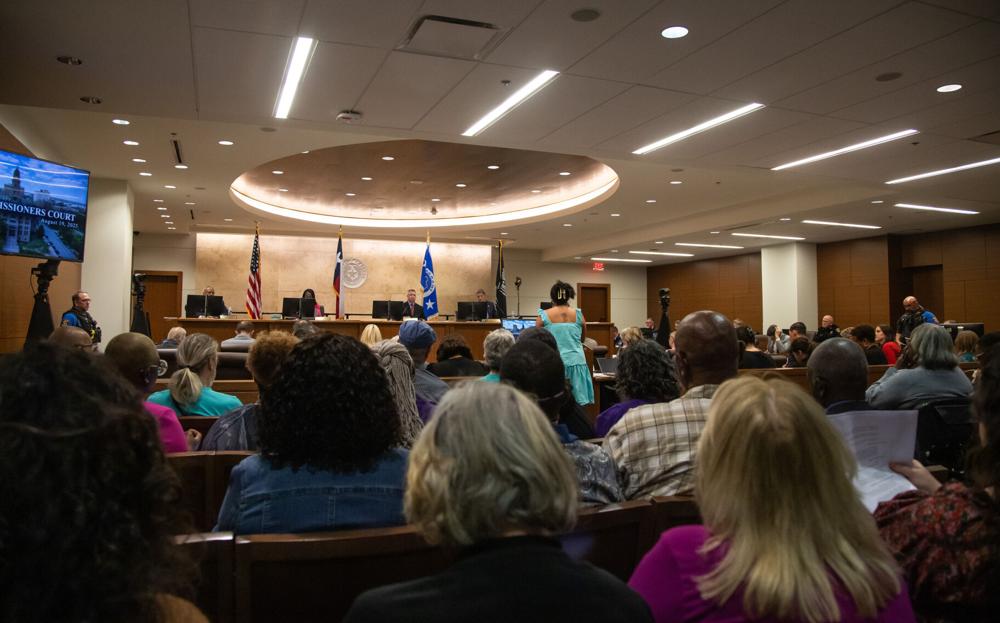
- UTA’s new bike loan program allows students to check out reclaimed bikes for freeUTA is introducing a free bike loan program offering semester-long access to reclaimed bicycles for students. The two-year pilot program kicked off Aug. 8 and promotes wellness, independence and hands-on learning at no cost, said Larry Cummings III, Parking and Transportation Services communications manager, in a document to The Shorthorn. In a collaboration among Parking and Transportation Services, UTA Libraries, Student Affairs and the Office of Sustainability, the program supports UTA’s sustainability goals, according to the Parking and Transportation Services website. The program offers a variety of bikes, including mountain, road and cruiser style bikes. The program tracks student participation, bike usage, repair needs and feedback to dictate if it can extend beyond the pilot phase, Cummings said. Students can check out one of 50 bikes by submitting a request through their MavPark account. The request will add students to a waitlist on a first come, first served basis. Bikes are available at the Parking and Transportation Services office. Liam Crowley, Walkable Arlington president and a bike mechanic under the pilot program, said he found freedom in owning his bike. “I was very dependent on my parents to drive me around places,” Crowley said. “I got that bicycle, I could go anywhere I wanted, whenever I wanted.” When a bike is available, students will be sent a bike loan agreement to review and sign on their UTA email. Students will then receive an email with the bike number, lock number and pickup location. “As long as the bike is returned by finals week, Mavs are free to ride them as far as their legs can carry them,” Cummings said. Students are responsible for any repair or replacement costs while a bike is in their possession, he said. The program also offers drop-in DIY repair guidance from 10 a.m. to 3 p.m. Monday through Friday. Hours may vary based on student staff availability. The bicycles are due at the office before closing time Dec. 10. Crowley said that with several bike shops in Arlington closed, having a resource that helps students fix their own bikes can empower students to maintain their bikes. “I’m really happy to see it,” he said. “Before this program started, there’s a lot of bikes that were either just scrapped for metal or they’re auctioned off.” Crowley said that while bicycles may not be for everyone, students are welcome to try them out and return the bike if it's not for them. “Bikes are fantastic, especially on a college campus,” he said. “They’re such a great piece of mobility.” @_.lexlie_ news-editor.shorthorn@uta.edu
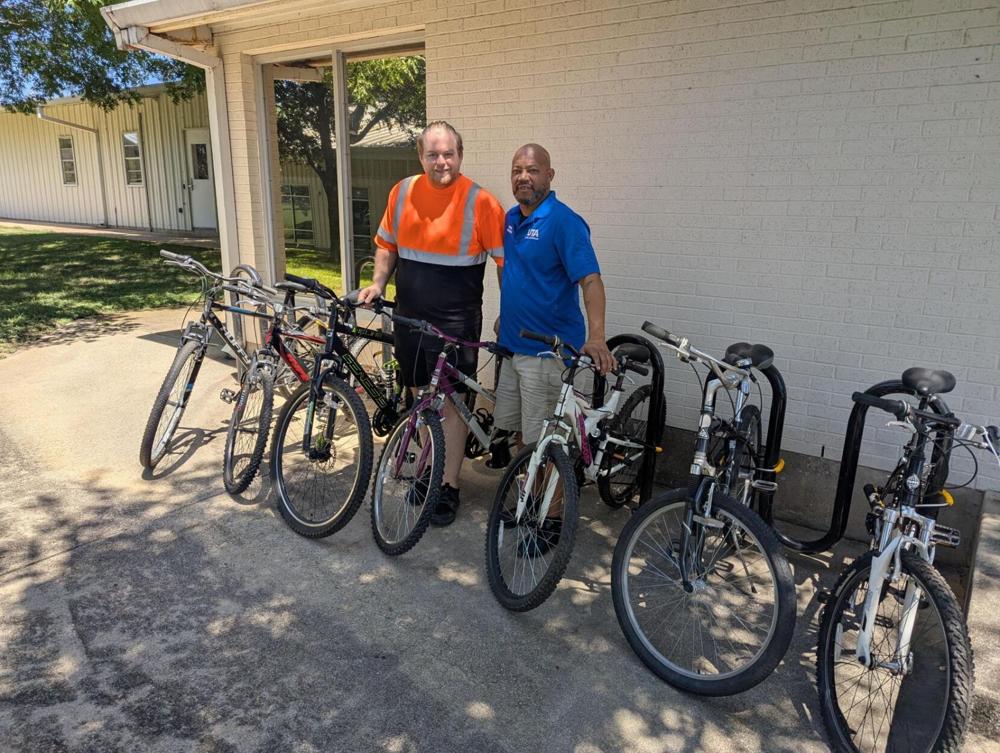
- Meet The Shorthorn’s fall 2025 editor teamYou’re reading Meet The Shorthorn, a series of short articles explaining our processes and providing clarity for our readers. During the fall semester, The Shorthorn has about 40 staff members, and nine of them are editors. The editors assign and edit content, as well as hire and manage their staff members. Get to know the fall 2025 editor team below. Pedro Malkomes is the editor-in-chief and a journalism senior with a technical writing minor. He manages the entire newsroom and is responsible for the publication’s content direction. Malkomes enjoys reading sci-fi books and manga, playing video games and playing soccer with his friends. He also enjoys biking and listening to too much music. @pmalkomes | editor.shorthorn@uta.edu Leslie Orozco is the managing editor and a criminal justice and psychology junior. She helps wherever needed as she manages daily production cycles and newsletters and supports fellow section editors. In her free time, Orozco tries to enjoy some peace and quiet before needing something to do again. She also enjoys playing video games, rewatching comfort shows, reading psychological thrillers, drinking coffee and watching Formula 1. @_.lexlie_ | managing-editor.shorthorn@uta.edu Rachel Kenealey is the copy desk chief and an English junior with creative writing and technical writing minors. She leads a team of copy editors that ensure accuracy, clarity and consistency in articles before publication. In her free time, she is usually reading Brandon Sanderson or Mary Oliver, rewatching a sitcom or listening to a musical. She also enjoys crafts and runs a crochet business. @rlkenealey | copydesk-editor.shorthorn@uta.edu James Ward is the news editor and an English senior with business administration and creative writing minors. He is responsible for all content across news and life. Ward enjoys listening to indie and alternative music, as well as watching foreign movies in his free time. He is also an avid Dallas Stars fan. @j.e.journalism | news-editor.shorthorn@uta.edu Taylor Sansom is the associate news editor and a criminal justice junior. She helps manage the news desk alongside the news editor. Outside the newsroom, Sansom enjoys flipping through a good book, rewatching the 2011 musical “Newsies” and adding to her mini figurine collection. She is also an avid Colorado Avalanche fan. @tay._.sansom | news-editor.shorthorn@uta.edu Kale Ivie is the sports editor and a journalism senior. He leads a team of reporters to produce in-depth coverage of local and on-campus athletics. Ivie has a deeply rooted love for all sports, primarily soccer and baseball, and spends his time away from the desk playing video games and hanging out with friends or family. A typical day ends with pickup soccer at the intramural fields and heading home to watch a show or read. He’s a big fan of DC Comics and has a wide range of musical interests. @kaleivie_ | sports-editor.shorthorn@uta.edu Haley Walton is the design editor and an interactive media senior. She leads a team of designers and illustrators to create visuals that complement articles and designs the look of the print edition. Walton enjoys telling stories and educating people through art in her personal time as well. She loves legos, video games and immersing herself in Norse mythology. @yasursketches | design-editor.shorthorn@uta.edu Sairam Marupudi is the engagement editor and a marketing and English junior. She oversees every social media platform for The Shorthorn and its daily newsletter. Marupudi loves anything superhero or mythology related, especially if they’re together. She spends her free time catching up on her never-ending list of books to read, hyperfixating on her hobbies, stress baking and collecting Funko Pops. @marupudisairam | engagement-editor.shorthorn@uta.edu Samarie Goffney is the multimedia editor and a journalism senior. She oversees a desk of creative individuals who produce visuals for the publication, including photos and videos. Goffney enjoys music, playing piano and gaming. She also loves a good thriller movie or book. @pixaperfect_ | photo-editor.shorthorn@uta.edu news-editor.shorthorn@uta.edu
- Tarrant County to consider reducing number of voting locations for November electionTarrant County commissioners will consider Tuesday whether to reduce the number of voting locations during early voting and on Election Day for the Nov. 4 election. If commissioners approve the proposed list, Tarrant County residents would have 24 early voting locations — four of which are in Arlington — down from the 51 open during the 2024 presidential election. The list doesn’t include UTA or any college voting sites. Election Day voting locations will drop to 214 — down from last year’s 350, according to the proposed list to commissioners. During the November 2023 election, the last time UTA wasn’t a polling location, the county had 44 early voting sites — six of them in Arlington — and 330 open on Election Day. The commissioners court will meet at 10 a.m. Tuesday at the Tom Vandergriff Civil Courts Building in Fort Worth. Commissioners vote on polling locations every year. November’s ballot includes a special election in parts of Tarrant County for Texas Senate District 9 as former state Sen. Kelly Hancock, R-North Richland Hills, left the position to serve as the state’s interim comptroller. The seat represents northern and western parts of Tarrant County, which includes North Richland Hills, Keller, Haltom City and a small portion of Arlington that covers UTA. Voters will also decide on 17 proposed constitutional amendments, ranging from property tax relief and parental rights to judicial accountability and border security. Last fall, commissioners also considered removing early voting sites at colleges, which led to state representatives hosting a public gathering on campus and UTA students participating in public comment at the meeting. Commissioners ultimately voted 4-1 to keep the sites. Tarrant County Judge Tim O’Hare was the only dissenting vote, saying that the college early voting sites were located nearby other polling places. The last day to register to vote is Oct. 6, and voters must apply for a mail ballot by Oct. 24. Early voting is from Oct. 20-31. @DangHLe news-editor.shorthorn@uta.edu
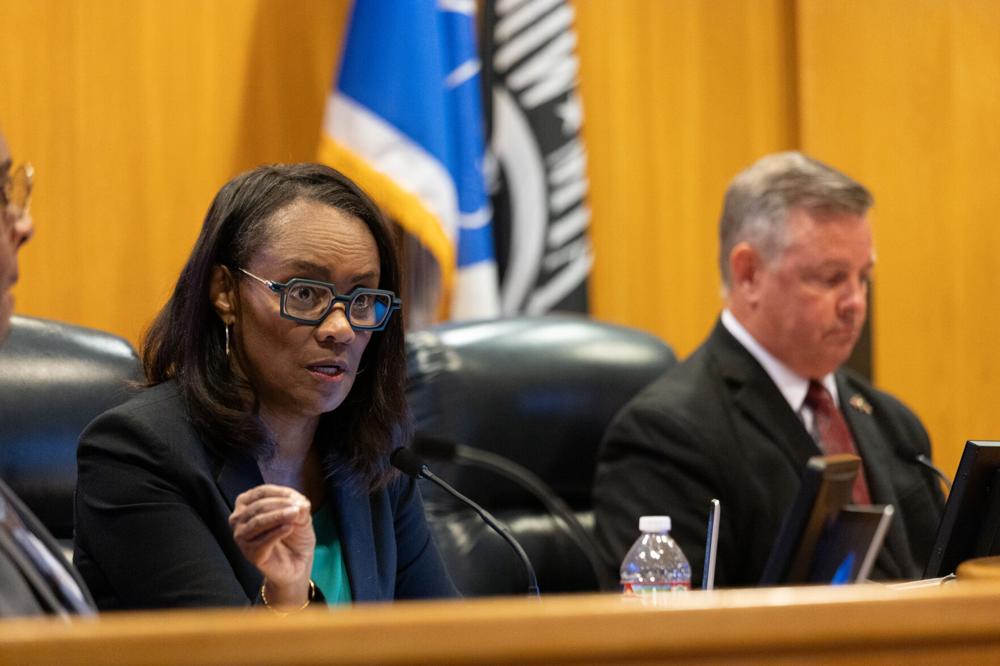
Load more...
Loading...


